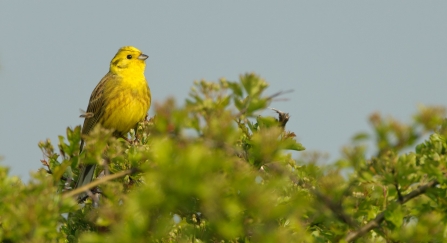
Yellowhammer (Emberiza citrinella). Image by: Chris Gomersall/2020VISION.

Yellowhammer (Emberiza citrinella). Image by: Chris Gomersall/2020VISION.
A new report published today – commissioned by The Wildlife Trusts, RSPB and WWF – highlights big gaps in environmental protections post-EU Exit and argues that a new system of regulation is needed to maintain and improve farming and environmental standards.
The Agriculture Bill, which will be debated in the House of Commons on Monday 3rd February, presents a welcome transformative vision for agriculture in which payments will be made to farmers to tackle the climate and nature crisis. However, it misses the need to improve the way Government will ensure farmers meet minimum environmental standards post-EU Exit. This puts the natural world – from hedgerows and soils, to ponds and the wildlife that depends on them, at risk.
The three wildlife charities are calling on the Government to close the gaps in regulation and include a power in the Agriculture Bill to introduce and enforce a new regulatory framework for agriculture which addresses the gaps.
Risks and opportunities of a post-EU environmental regulatory regime for agriculture in England, the new report by the Institute of European Environmental Policy (IEEP), examines the risks to nature of losing the current conditions that are attached to farming support. It also reveals the gaps in domestic legislation which need filling. Without additional legislation, we stand to lose regulations which ensure that:
The report also notes that:
Ellie Brodie, The Wildlife Trusts’ senior policy manager, says:
“We’re really concerned that the Agriculture Bill does not contain the regulation that’s so desperately needed and nature will continue to take the rap. Gaps must be filled and enforcement must be strengthened if we’re to address the nature crisis and climate emergency. It’s absolutely vital that all new regulations apply to every single farmer – not just those who sign up to the schemes designed to help wildlife – otherwise, to take just one example, damaging pesticides could pollute rivers and taxpayers will pay an even higher price for their clean drinking water.
“A new delivery model should build a more collaborative relationship between farmers, land managers and enforcement agencies by striking a better balance between information, advice, enforcement and incentives. This will require substantial funding.”
Tom Lancaster, Head of Land, Seas and Climate policy at the RSPB says:
“The Agriculture Bill includes vital new powers to pay farmers to restore nature, but is silent on the rules and regulations for farming in the future. With the change that Brexit will bring, this presents real risks to our soils and hedgerows, and the nature that depends upon them.
“Hedgerows may just be dividers between crops to us, but they are often hidden worlds, teeming with the amazing wildlife that calls our farmland home. The government must not let this once-in-a-generation opportunity to reform farming policy be undermined by these gaps in the protections for wildlife across our countryside.”
Debbie Tripley, Director of Environmental Policy and Advocacy at WWF, says:
“Unless the Government starts plugging the gaps left by leaving EU regulation, our soils, hedgerows and the wildlife that depends on them are at risk. We need firm but fair enforcement and advice that ensure food is produced to high environmental standards across the country.
And our farmers’ efforts must not be undercut by imports that are cheap in price but catastrophically expensive for our natural world and climate - so future trade deals must clearly reject deforestation and other poor agricultural practices, at the same time as we invest in standards and proper enforcement in the UK.”